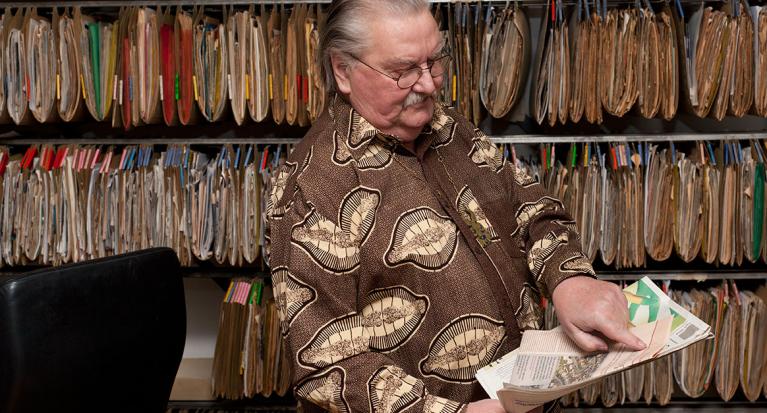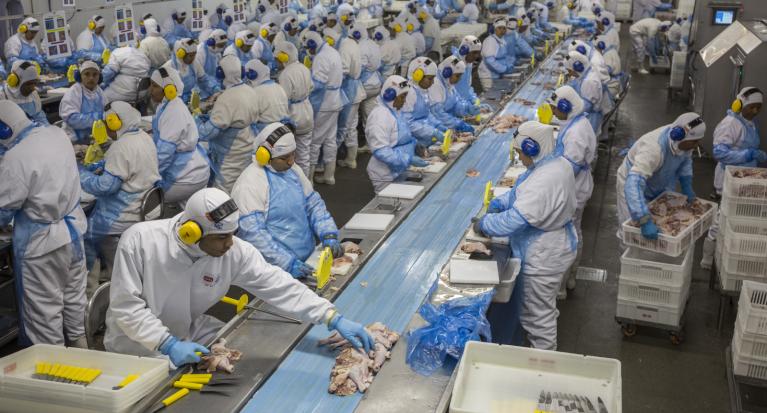We can feed the world …
… but first we have to change our way of thinking.
Andreas Kohli spoke with Nina Buchmann
In the World Agricultural Report 2008, more than 400 experts recommend, among other things, expanding organic farming to fight hunger. Do you think that’s the right approach? Is it possible to feed the world on the basis of organic farming?
The arguments for and against organic farming are often highly ideological. In many cases organic farming produces lower crop yields or requires more work for the same yield because farmers can’t spray or fertilise their crops or because they need to use other fertilisation methods. Depending on the plant – maize, rice or grain, for example – per-hectare yields from organic farming are 20 to 30% lower than yields from conventional farming. With other products such as fruits or nuts, yield differences are lower. So if we want to use only organic methods to produce the same amount of food as we have today, we will need more land. The problem is that we probably don’t have enough land in the world for this purpose.
Can we solve the hunger problem by increasing yields?
In fact, we’re already producing enough calories worldwide today – in some regions, almost too much. One of the problems is that too much food is lost during production, processing, transport and storage. If we had less food loss, we could grow more products organically. But to do so, other conditions would also have to change. That’s what makes things so complicated.
Where do the largest losses occur?
The few studies conducted so far show that greatest loss and waste occurs at the consumer level, not during production or in stores. For example, in Switzerland 50% of purchased calories are lost in the refrigerator, the bread basket or elsewhere. In developing countries food goes bad because there is no refrigeration, or because it is infested by pests that make it inedible. Once you know that half of all food is lost after production, you begin to see the question of the production method in a new light.
Growing one’s own food, cooperatives, slow food and urban gardening are all big trends these days. Wouldn’t it make more sense to promote small-scale private farms with short distances between producers and consumers?
It depends on what you mean by “small”. For example, a home garden in Sri Lanka measuring two square metres feeds exactly one family. But if no one is there to tend to the garden on a regular basis – to get rid of snails and monkeys – it yields hardly anything. These small plots are very labour-intensive, and someone constantly has to take care of them. We often have very romantic ideas about what it means to be a farmer.
What’s the best place to begin?
Land rights are extremely important. Without land rights, sustainable agriculture is impossible. On their own plots of land that are passed down in their families, farmers will do much more to ensure that the soil remains fertile. In countries like China where land rights are practically non-existent, the soil is relatively overworked. One reason is that people can simply leave their land and lease another plot.
For several years now, China and India, for example, have been buying or leasing large tracts of agricultural land in Africa. What do you think of the problem of land grabbing?
There are a variety of factors and many details to be considered. As I just said, land rights are crucial for sustainable production. Then there’s the question of who farms this purchased land and under what conditions. The farmers are presumably hired. This means they don’t own the land but they have an income. Still, the land is lost to the nation. In addition, long transport routes over land and sea – such as between Africa and China – lead to greater food loss and waste. Finally, there’s the socio-political dimension. Is corruption in play? What happens to the money? Does it remain in the country, and is it reinvested? Or does it end up in someone’s private bank account?
Entomologist Hans Rudolf Herren, recipient of the World Food Prize, is fighting against the use of pesticides. Can we get by without pesticides in the future?
We’ll never be able to farm 10,000 hectares of wheat on a monoculture basis using organic methods alone. Disease pressure is simply too high. When pests infest such monocultures, they spread very quickly. We can’t get by entirely without pesticides. Perhaps we should try to get away from these monocultures.
Aren’t large industrial monocultures per se less sustainable than smaller farms?
There’s no point in playing off big producers against smaller ones. Often a certain amount of land is necessary for efficient production, but large agribusiness units can be made more sustainable as well. Just think of northern Germany, Poland and Ukraine. In all these places you have large organic farms that emerged from old socialist enterprises.
How can monocultures be made more sustainable?
A lot can be achieved through intelligent crop rotations. This method increases biodiversity and uses fewer resources over the longer term. I had an interesting experience in Sri Lanka, where two farmers were working adjacent fields. One had a leek monoculture, the other planted carrots and leeks. The first argued that it was too difficult for him to tell the difference between the leeks and the carrots during harvest. The other said that it was easy for him to see the difference and that harvesting one after the other was no problem.
In the future, modern high-tech harvesting machines – “precision farming” – will probably be able to distinguish between leeks and carrots and make it possible to grow diverse crops instead of monocultures on vast tracts of agricultural land. Once the need is great enough, these machines will be developed. At the World Food System Center of the ETH Zurich, we are studying, among other things, how conventional farming can be made more sustainable. Our goal is to maintain and even increase soil fertility. Ultimately, this focus on sustainability is the central idea behind organic agriculture. “Only organic” or “only genetic” isn’t the answer. In order to secure the world’s food supply, we need a variety of approaches.
First the Green Revolution, then genetic engineering and globalisation – despite the rapid development of agriculture over the last 50 years, it has not been possible to reduce the number of undernourished.
Over the last 40 years, the world’s population has grown from about four billion to over seven billion. Despite this, the absolute number of undernourished has remained constant at about 800,000. The proportion of undernourished in the world’s population has declined steadily. Thanks to the Green Revolution alone – plant breeding, fertilisers, irrigation and so on – we can produce a more or less adequate supply of food for more than seven billion people. These developments have been a major force behind population growth in Asia. The more modest success in Africa has to do with greater climate variability and a number of other factors.
What do you think are the most important measures for ensuring a sustainable supply of food for the world’s population?
The first step towards food security lies in production. The second factor is access to food – the opportunity to buy and transport a product. The third is the question of whether my body can use the food or not. The fourth is resistance to external influences, whether political, economic or environmental in nature. All these factors must be stable in order to ensure true food security.
What does this mean in concrete terms over the next 20 years?
In the area of production, we need to deal with climate change. Rising temperatures are necessitating new species and farming methods, including the more efficient use of pesticides, fertilisers and water. The use of solar energy and better cooling systems could improve resource efficiency in the processing stage. Finally, it would be helpful if the WTO could reduce food price volatility and speculation. But this is ultimately a political and social issue. When a society pays four francs instead of forty for a kilo of meat, it has consequences.
So individual behaviour is decisive?
A lot starts with the individual. I think we can achieve a lot with consumers. It really is absurd that people throw away 50% of purchased calories. We need additional educational efforts to change this behaviour. It would be great if a sustainable lifestyle emerged, or if the interest in a sustainable lifestyle replaced the greed for more and more things.
DOSSIER Globalisation and Development |
| We can feed the world … | |
| World hunger | |
| The insatiable demand | |
| All dossiers | |
The geoecologist Nina Buchmann is the director of the World Food System Center of the Swiss Federal Institute of Technology (ETH) in Zurich, an excellence centre founded in 2010 to promote sustainable food production for a healthy world population.
Agriculture
Agriculture – or the cultivation of land to produce plants or raise animals - is the source of most of the food we buy. Agriculture has been practised for about 10,000 years, first in the Middle East, then in other parts of the world. It probably began with the domestication of certain plants...


